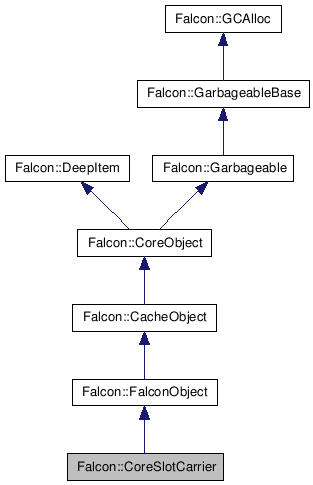Falcon::CoreSlotCarrier Class Reference
Class taking care of finalizing the core slots when they are published to scripts. More...
#include <coreslot.h>

Public Member Functions | |
| virtual CoreObject * | clone () const |
| Creates a shallow copy of this item. | |
| CoreSlotCarrier (const CoreSlotCarrier &other) | |
| CoreSlotCarrier (const CoreClass *generator, CoreSlot *cs, bool bSeralizing=false) | |
| void | setSlot (CoreSlot *cs) |
| Change slot after the creation of this carrier (for VMSlot_init). | |
| virtual | ~CoreSlotCarrier () |
Detailed Description
Class taking care of finalizing the core slots when they are published to scripts.
Constructor & Destructor Documentation
| Falcon::CoreSlotCarrier::CoreSlotCarrier | ( | const CoreClass * | generator, | |
| CoreSlot * | cs, | |||
| bool | bSeralizing = false | |||
| ) |
| Falcon::CoreSlotCarrier::CoreSlotCarrier | ( | const CoreSlotCarrier & | other | ) |
| virtual Falcon::CoreSlotCarrier::~CoreSlotCarrier | ( | ) | [virtual] |
Member Function Documentation
| virtual CoreObject* Falcon::CoreSlotCarrier::clone | ( | ) | const [virtual] |
Creates a shallow copy of this item.
Will return zero if this item has a non-cloneable user-defined data, that is, it's not fully manageable by the language.
Clone operation requests the class ObjectManager to clone the user_data stored in this object, if any. In turn, the ObjectManager may ask the user_data, properly cast, to clone itself. If one of this operation fails or is not possible, then the method returns 0. The VM will eventually raise a CloneError to signal that the operation tried to clone a non manageable user-data object.
If this object has not a user_data, then the cloneing will automatically succeed.
- Returns:
- a shallow copy of this item.
Reimplemented from Falcon::FalconObject.
| void Falcon::CoreSlotCarrier::setSlot | ( | CoreSlot * | cs | ) |
Change slot after the creation of this carrier (for VMSlot_init).
The documentation for this class was generated from the following file:
- /home/gian/Progetti/falcon/core/include/falcon/coreslot.h
 1.5.8
1.5.8